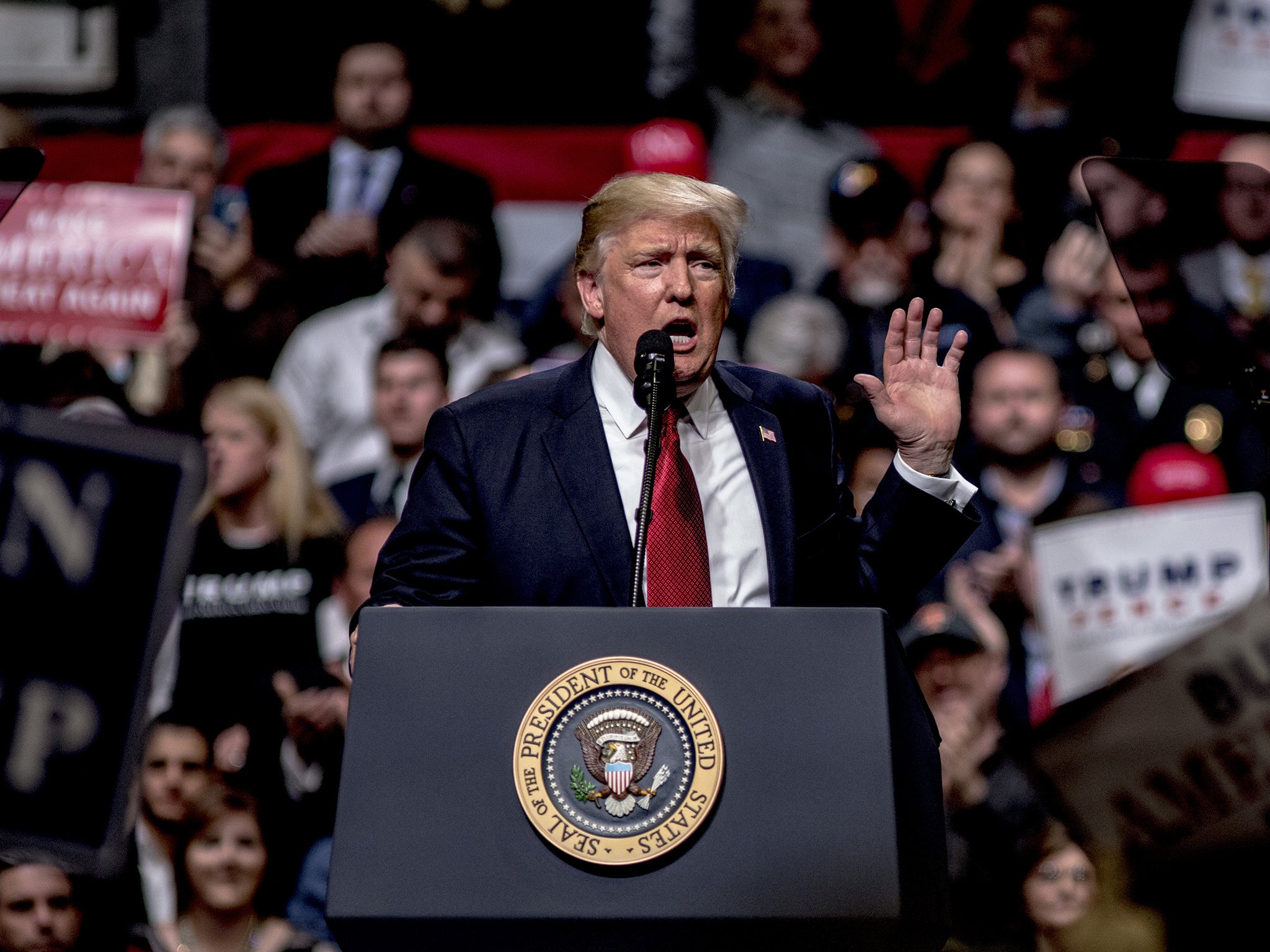Donald Trump still can't get the votes to repeal Obamacare
Mr Trump has repeatedly promised to repeal the health care legislation but faces opposition from his own party

Your support helps us to tell the story
From reproductive rights to climate change to Big Tech, The Independent is on the ground when the story is developing. Whether it's investigating the financials of Elon Musk's pro-Trump PAC or producing our latest documentary, 'The A Word', which shines a light on the American women fighting for reproductive rights, we know how important it is to parse out the facts from the messaging.
At such a critical moment in US history, we need reporters on the ground. Your donation allows us to keep sending journalists to speak to both sides of the story.
The Independent is trusted by Americans across the entire political spectrum. And unlike many other quality news outlets, we choose not to lock Americans out of our reporting and analysis with paywalls. We believe quality journalism should be available to everyone, paid for by those who can afford it.
Your support makes all the difference.The Trump administration is still short on votes to repeal and replace Obamacare and the vote has been postponed until at 24 March.
If 23 Republicans dissent, the American Health Care Act will not pass the House of Representatives.
“We've made very reasonable requests and we're hopeful that those reasonable requests will be listened to and ultimately agreed to,” head of the dissenting Republican Freedom Caucus Representative Mark Meadows said after meeting with President Donald Trump at the White House.
The vote count estimates range from 29 to 36 Republicans who have said they cannot support the bill in its current form, according to the New York Times, Washington Post, CBS News, NBC News, and The Hill. White House Press Secretary Sean Spicer called the meeting with dissenters "intense".
One option for Congress is to reschedule the House vote, although the White House have said they expect the vote to go ahead and have not asked House Speaker Paul Ryan to delay the vote
Daniel Dawes, a health care attorney and director of government affairs at the Morehouse School of Medicine, told The Independent that not rescheduling the vote is a matter of “pride...making a statement.”
The seventh anniversary of Obamacare is 23 March.
Vice President Pence and Office of Management and Budget Director Mick Mulvaney have been “flooding the Hill,” White House Press Secretary Sean Spicer has said during a briefing in efforts to convince members of the Freedom Caucus.
They have been making concessions to get people on board but Mr Dawes said these were just “empty promises” because the bill came up through the “reconciliation process.”
This process assures that Democrats cannot filibuster the bill by Democrats in the Senate, where the bill would go for vote once it passes the House.
However, it also limits the amendments the White House can place on the bill because of Byrd’s Rule, part of Senate rules that prohibits including provisions in reconciliation legislation are “not germane” to spending, revenue levels, or the debt limit, according to Mr Dawes.
It means that if the White House has made promises on language around abortion, the requirement that able-bodied poor people on Medicaid would be required to work in order to get coverage under the plan, covering those with pre-existing conditions, and allowing those under 26 years of age to remain on their parents’ insurance - they would be stripped away if/when the bill reaches the Senate.
One of the main concerns for the Freedom Caucus is taking out the Obamacare holdover of “essential health benefits,” which requires insurance companies to provide a set of issues covered for all beneficiaries in the individual market.
These benefits include mental health and substance abuse counselling, maternal and newborn care, women’s health screenings, and paediatric care to name a few.
The argument is that requiring insurance companies to cover these items for everyone drives up the cost of premiums.
Mr Dawes, who worked with universal healthcare advocate late Senator Ted Kennedy, explained that indeed the “essential health benefits” clause does drive up premiums but the service coverage is meant to be “preventative.”
However, he said, “we found that most Americans were under-buying what they need.”
So eventually, they would need to purchase new plans or supplemental insurance to account for unexpected illnesses, accidents requiring physical therapy, or pregnancy, Mr Dawes said.
Their premiums could go up on the ‘back end’ more than if insurance companies had been required to cover those items in the first place, so eliminating the clause would only help Republicans get a better score from the Congressional Budget Office which rates proposed bills.
A separate bill passed the House on 22 March regarding “association health plans,” which was originally part of the larger Republican replacement plan.
According to Mr Dawes it was likely left out because it would have driven up the overall cost of the replacement plan.
Under the new bill, small business owners can “pool” their employees and approach insurance companies as a small group to negotiate for better rates on premiums - the thinking is that a larger pool of people drives down cost.
Those people within that ‘association’ will see lower premiums, however they are decreasing the overall pool within that particular state. If enough small businesses take advantage of this scheme, the premiums of others in the state market will go up because they are now in a smaller pool.
Join our commenting forum
Join thought-provoking conversations, follow other Independent readers and see their replies
Comments